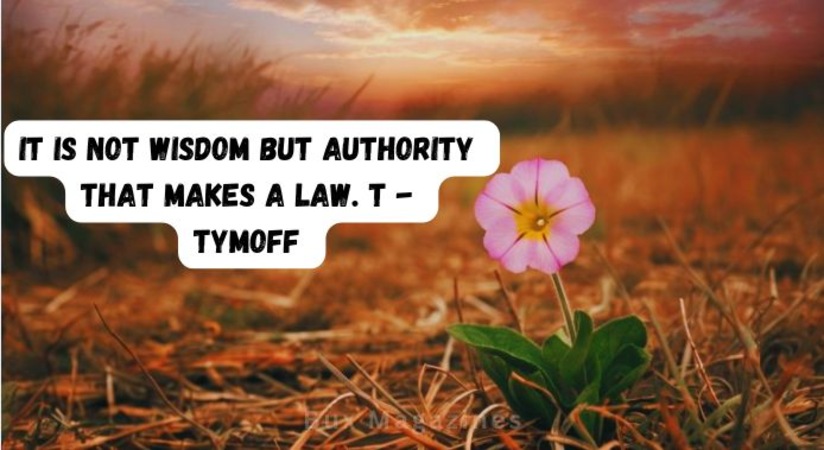The quote from Tymoff, “It is not wisdom but authority that makes a law. t – tymoff” is a powerful statement with us in our knowledge of the process at play in making laws. In this discussion, the central notion that laws are usually created by those who are who are in control rather than the product of common sense is emphasized. In our society, the creation of laws, their interpretation, and the enforcement of laws are influenced by this difference, and it is crucial to be aware of this.
Authority vs. Wisdom
The Purpose of Authority
The power of the legal and institutional system to make and keep laws is often vested in people or governing bodies. This authority is crucial to the functioning of any lawful system because it creates the structure in which wisdom operates.
The Factor of Wisdom
Wisdom enhances the equity and quality of laws, and authority sets the rules of engagement. Wisdom is crucial to developing fair and equitable laws since it includes moral considerations, social values, and the ability to anticipate future outcomes.
The Concept of Wisdom in Law-Making
Wisdom, on the other hand, is the capacity to make reasonable decisions using one’s experience, understanding, and knowledge of the context. It involves not only acquiring information but also strategically applying it. In a perfect world, wisdom will ensure that the law is fair, just, and beneficial for the entire society in the lawmaking process.
Challenges of Authority-Driven Laws
Laws drafted by people in positions of power can cause significant problems, including abuse of power. Throughout history, numerous examples have been given of the inhumane laws passed by totalitarian dictatorships. They often prioritize the protection of power rather than the well-being of the entire population.
It is not wisdom but authority that makes a law. t – tymoff Modern Legal Systems

Democratic Principles
In modern democratic societies, representative institutions, like congresses and parliaments, are utilized to make laws. People elect these institutions, which are meant to express the opinions and wisdom of the people. But the power of the people is still of prime importance. Economic, political, and social pressures could influence the choices of politicians, who are accountable for developing and implementing laws.
The Work of the Judiciary
The judiciary is responsible for ensuring that laws conform to a nation’s constitution and legal rules through the interpretation and application of laws. The law is determined by the rulings of judges with enormous authority. Though judicial decisions are supposed to be based on the wisdom of law and logic, the judiciary’s authority is vitally important.
Dictatorial regimes
In authoritarian dictatorships in which central authorities are prevalent, the government makes laws. It enforces them without much regard for the rule of law or the rule of law. These regimes highly value security and control over individual freedoms and rights. For example, those laws in a dictatorship guarantee absolute sovereignty and stifle all forms of opposition.
Conclusion
“It is not wisdom but authority that makes a law. t – tymoff, This quote highlights a crucial truth about the nature of law and governance. Acts are a driving force in developing and implementing regulations, and wisdom is vital to their legitimacy and efficacy. The past and present examples demonstrate the complex relationship between authority and knowledge in lawmaking. It is crucial to find an equilibrium between these two elements to create legal systems that enhance justice, protect the rights of individuals, and serve the public good.
ALSO READ: Love what you have before life teaches you to lov – tymoff






